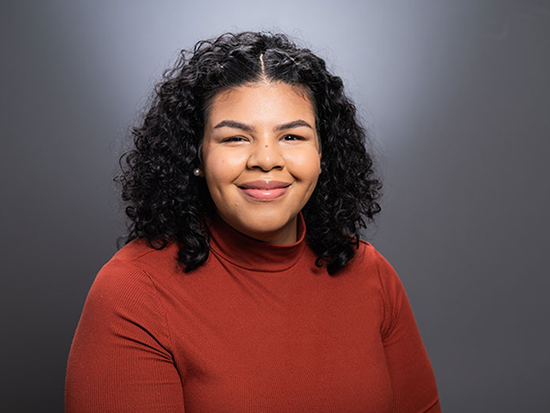 Gracemarie Cepero Lopez
Gracemarie Cepero Lopez Photography: Lexi CoonGracemarie Cepero Lopez is resilient.
Born and raised until about age 7 in Puerto Rico, Cepero Lopez attended a rural high school in Seale, Alabama, in Russell County. She grew up hearing how important education is from her parents, who have always worked hard — her mother as a physical therapy assistant and her father as a truck driver, sometimes gone for months.
In 2021, Cepero Lopez was on a presidential scholarship on a pre-med track at the University of Alabama at Birmingham when her mother had a medical emergency. During finals week, she had to withdraw from school.
She could not be away from home too long and knew she could not fulfill the necessary research requirement for that major. So, as a heritage speaker, when Cepero Lopez came back to school, she switched her Spanish minor to a major in the College of Arts and Sciences’ Department of World Languages and Literatures.
Her determination is paying off. Cepero Lopez is graduating with High Distinguished Honors from the UAB Honors College on Dec. 10. She then wants to pursue a Master of Science degree in biomedical health sciences in the UAB School of Health Professions. That degree is a steppingstone to medical school, and her goal of being a primary care physician, she says. The 11-month program would mean a two-and-a-half-year period before she can start medical school.
During that time, she would like to have more experiences in the medical world “to enrich and affirm” her decision to go to med school. In between degrees, Cepero Lopez hopes to work as a medical interpreter.
“There is a high need for medical interpreters across the country, especially in the Southeast,” she said. “There is a huge Spanish-speaking population, and there are not enough interpreters to satisfy that need. It would help me to gain experience and ensure what I am doing is what I want to do (in my career).” Fort Benning is near her hometown, along with several hospitals, and a wealth of Spanish speakers live in and visit the area to train. The Spanish-speaking community does not have the health services that many English-speaking people do because of that language barrier, Cepero Lopez says.
Her mom earned an associate degree and has worked with thousands of soldiers helping them recover from serious injuries and illness. Her dad was close to finishing his bachelor’s degree, but other circumstances stopped him. Her parents could not continue their educations, and she saw how they desired to become as proficient as possible in their careers.
“My dad said, ‘Grace, you have to get your education. You have to get your degree,’” Cepero Lopez said. “That little bump in the road when I had to withdraw, it was really like an ‘Am I gonna stop?’ point; but my parents did not allow it. Honestly, I understand. They knew what the world was going to give you if you don’t have your education.”
Cepero Lopez heard about UAB during college applications week and felt that she would be able to earn merit-based scholarships here. When she toured the campus, she knew UAB would be her choice.
“Visiting other schools, something I saw was UAB had a lot more diversity on its campus,” Cepero Lopez said. “I already knew that I wanted to go here, so going out on campus and seeing students who looked like me, talked like me, I said, ‘Yeah, this is definitely the school that I want to go to.’”
The Department of World Languages and Literatures is a close-knit group, where she was able to get to know the other students and faculty, who have been very supportive, Cepero Lopez says.
“I felt like, in other departments, just because there are so many students, it is really hard to stand out, or to make an amazing stellar first impression; whereas with this department, it is actually quite nice to have fewer students in the classroom,” she said. “We all know each other’s names, each other’s struggles and ambitions.”
The education she has received here will serve her well in her life’s journey, says Professor of Spanish Julián Arribas, Ph.D., chair of the Department of World Languages and Literatures.
“Heritage speakers, particularly of Spanish, are well positioned to quickly advance in language proficiency and achieve a near-native balance of the four language skills (reading, writing, listening and speaking) during their college years,” Arribas said. “A degree in Spanish will strengthen opportunities for students interested in most careers, but especially in the medical area.”
Cepero Lopez says her advice to students coming in is that the traditional four-year route is not going to look the same for everyone. Many people are not going to make it in four years.
“It doesn’t lessen you as a student,” she said. “Oftentimes the longer road is the one with more experiences, so any degree, any education is worth achieving no matter how long it takes.”